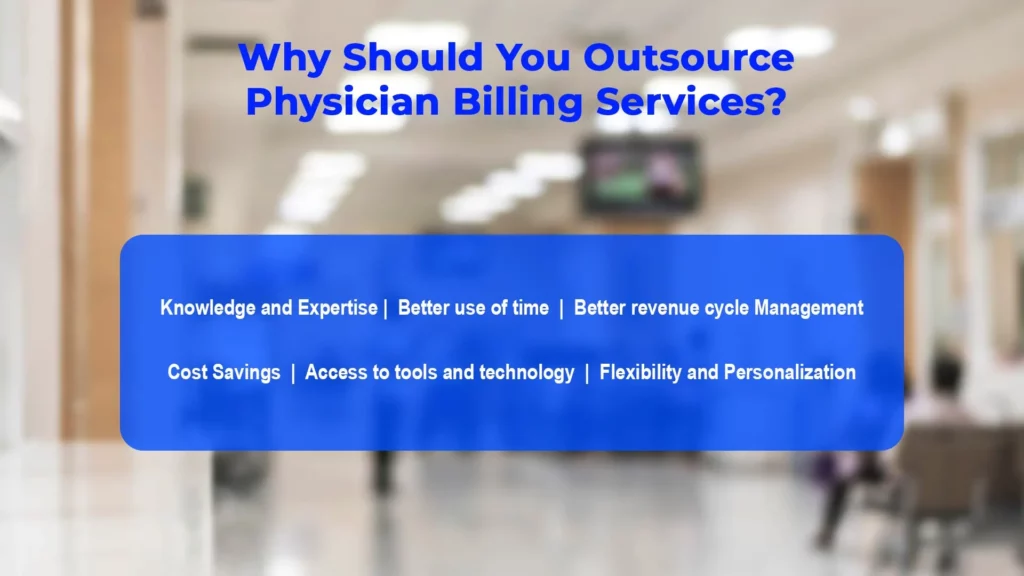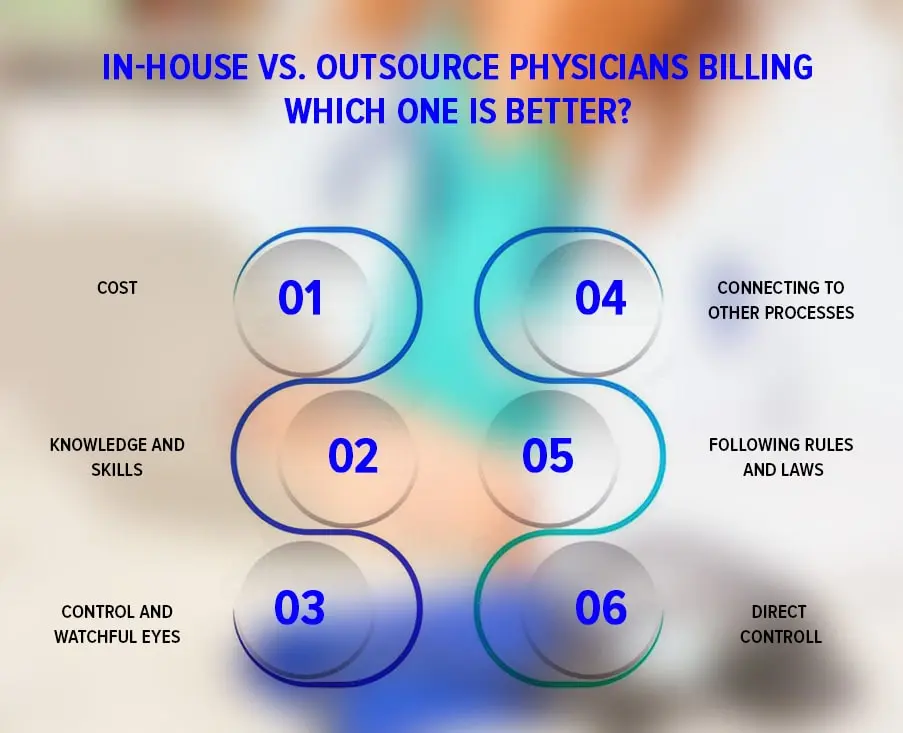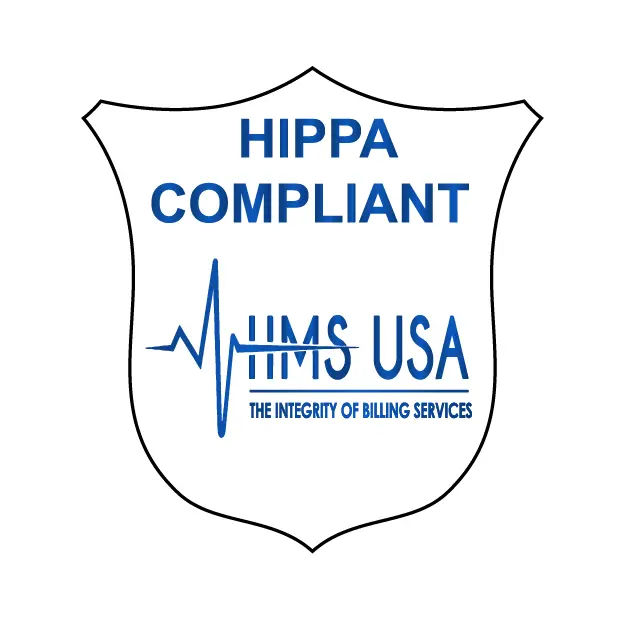
Which One’s Better For Physicians’ Billing In-House Or Outsourced?
There would be no healthcare without physician billing process. As healthcare costs keep increasing, it is more important than ever for providers to improve their revenue cycle management. Also, to ensure they get paid on time for the services they provide.
The physicians billing process is a complicated and varied area, and there are different types of billing services to meet the needs of healthcare workers. Whether medical billing services are done in-house or by a third party rests on many things, such as the healthcare provider’s resources, skills, and goals.
In-house billing might be cheaper and give you more control and monitoring, but outsourcing billing might give you more experience, speed, and freedom. Moreover, by knowing the differences between in-house and contracted physicians’ billing services, healthcare providers can improve their RCM and financial performance.
What Are The Two Types of Physicians Billing?
There are two kinds of physicians billing services: outsourced and in-house.
Outsourcing physician billing process means giving billing and reporting chores to a third-party provider. This kind of service can give you a lot of benefits, such as knowledge and experience, speed, and better control of the revenue cycle. Moreover, it also helps in lower costs, access to technology and resources, and the ability to change and adapt.
In-house medical services mean doctors themselves do billing and reporting. This kind of physicians’ billing process can offer benefits like more control and monitoring, and experience with patient data and systems.
Outsourcing physician billing services healthcare workers may consider outsourcing physician billing process for various reasons: cost savings, merging with existing in-house processes and improved security and privacy controls are just a few advantages to consider when considering outsourcing the process of physician billing to third-party providers; merging billing processes for other processes within an institution are also among those.
Why Should You Outsource Physician Billing Services?

Many benefits when considering outsourcing these services:
Knowledge and Expertise
Medical billing and coding require specific knowledge and expertise. Physicians’ billing services hire individuals with extensive training and experience with this form of billing; this leads to more accuracy with less mistakes being made during medical billing or coding processes.
These services ensure compliance with all current rules and best practices within a business, helping ensure compliance while decreasing audit risks and fines.
Better Use Of Time
Outsourcing medical billing and coding allows healthcare workers to refocus on patient care while freeing up more time and money to focus on other vital duties. A physicians billing service also simplifies this task for greater efficiency.
As a result, healthcare workers can reduce their workload and help the system run more smoothly overall. Improved revenue cycle management. Physician billing processes help healthcare companies enhance their revenue cycle management to enable faster payouts and increase cash flow.
Better Revenue Cycle Management
Cost Saving
Access To Tools & Technology
Physicians’ billing services often have access to advanced tools and technology that healthcare workers may need. These resources include billing software, code systems, and analytics tools.
Ultimately, it can help healthcare companies improve their financial performance and boost their revenue cycle management processes.
Flexibility and Personalization
Physicians billing services can give healthcare workers more freedom and flexibility regarding billing and coding. These services fit the needs and requirements of each healthcare worker, giving them a personalized level of service and support.
How In-House Physician Billing Services Benefits?
Even though there are many benefits to physicians’ billing process, some healthcare workers may handle these tasks themselves. Here are some possible perks of having billing services for doctors in-house:
- Control and Watchful Eyes
By keeping bills and reporting in-house, healthcare workers can have more control over and monitoring of these essential jobs. Moreover, providers can set their standards and methods for billing and tracking. This additionally ensures that these tasks align with their general business goals and objectives.
Providers can also keep an eye on performance and deal with any problems or concerns right away. This lowers the chance of mistakes and delays.
Knowledge of Patient Records and Systems
In-house physician billing process can improve billing and coding accuracy by using what they know about patient data and systems.
As a result, providers can use what they know about a patient’s medical history, diagnoses, and treatment plans. This ensures that claims get sent correctly and that customers get the correct bills on time.
- Cost Savings
When healthcare companies keep physicians’ billing services in-house, it saves them money. Providers don’t have to pay third-party service fees and don’t have to pay as much to train and hire new staff.
- Integration With Other Processes Inside The Company
Physicians billing services done in-house can be combined with other things done in-house, like arranging patients, keeping records, and collecting payments.
This merging can improve general speed and contact between departments, leading to better patient care and better financial results.
- Better Privacy and Safety Controls
By having physicians billing processes in-house, healthcare workers can better handle security and privacy. Apart from this, providers can ensure that patient data is treated in line with HIPAA rules. Not only they can set up their security processes but also procedures to protect patient information.
Keeping physicians billing processes in-house can give healthcare providers more control and monitoring. It is because they control patient data and systems, cost savings, better control over security and privacy, and integration with other in-house processes.
Read More: What are the CPT Codes for Mental Health Billings? – 2023
In-House Vs Outsource Physicians Billing: Which one is better?

Whether to do physicians billing processes in-house or outsource them comes down to the needs and resources of each healthcare provider. Here are some things to think about before making a choice:
Things to think about when picking out a physicians billing service.
1. Cost
Billing and marking chores can be done in-house or outsourced. Healthcare workers should think about the costs of both options. Hire and train more people for in-house services and buy tools and other resources.
You might have to pay for the service when you hire someone else to do something. In addition to this, providers should compare the prices of in-house services to the money they could save by hiring.
2. Knowledge and Skills
Healthcare workers should consider how much they know and their experience with medical billing and coding for physicians. They should also consider how much they know and how much experience they have with any possible physicians’ billing process.
If companies need to gain the right in-house skills, hiring outside help may be better. But if providers have skilled employees who can do these jobs independently, they may not need to outsource.
3. Control and Keen Eyes
When it comes to medical billing and coding for physicians, healthcare workers should think about how much power and oversight they want. Providers can keep a closer eye on things when services get done in-house because they have direct access to staff and tools.
Outsourced services may give you less control and oversight, but they may give you more freedom and let you tailor them to your needs.
4. Connecting to Other Processes
Healthcare providers should consider how physicians’ billing process will work with other parts of their company. Integrating in-house services with other processes may be easier than integrating external services, which may take more work.
5. Following Rules & Laws
Healthcare workers should ensure that any physicians’ billing process they choose follows rules like HIPAA. Providers should also consider any risks that come with outsourcing, like the chance of a data breach or other security issues.
Conclusion
Both types of medical physicians’ billing services come with their own set of advantages and disadvantages that healthcare workers must keep in mind when selecting one over another. Companies can utilize both in-house and outsourced billing services to optimize financial performance and revenue cycle management, with benefits for both sides.
Overall, healthcare workers must carefully consider all their options when selecting the ideal physician billing service to suit their needs and resources.
Read More: https://hmsgroupinc.com/blog/
FAQ's
At its core, in-house physician billing offers you direct control. However, hiring and training staff, investing in technology solutions and keeping up with industry changes are all factors you have to manage for yourself. Outsourcing can give you access to specialized knowledge while lessening paperwork load – potentially saving both time and money in the process.
Internal physician billing processes give you full control of the billing process and give immediate access to customer information and allow for swift resolution of billing problems.
Outsourcing physicians’ billing offers numerous advantages, including accessing experts who know how to navigate complex pricing regulations.
When considering whether or not to hire an in-house or outsource physician’s billing process, take into account your practice’s size and complexity as well as available resources, skillset needs and costs involved.
Outsourcing physicians’ billing can be helpful, but there are also some possible risks. Among these is the need for good contact and cooperation with the payment service provider. Moreover, making sure that data is safe and private, and choosing a seller with a good reputation.








